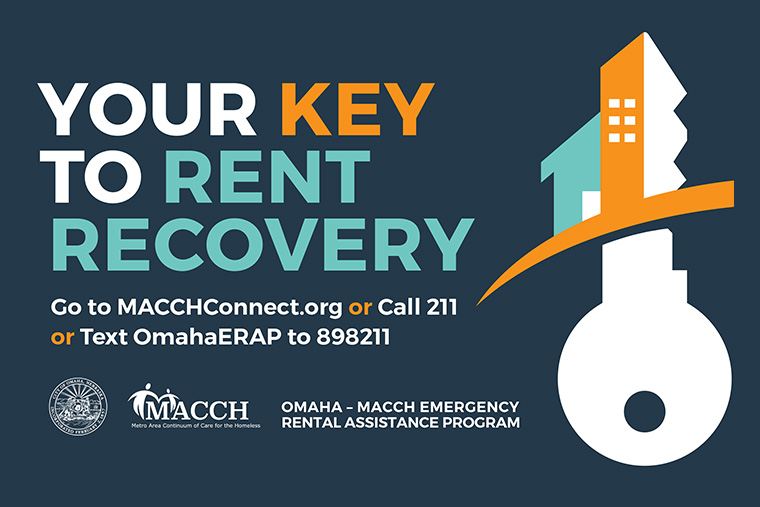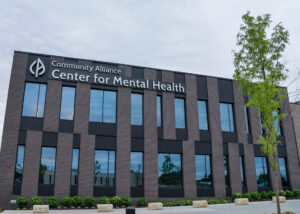Housing Insecurity – A Crisis Within a Crisis for Many

COVID-19 is said to have provoked a crisis within a crisis for many who were on the brink of housing instability even before the pandemic. Thousands of renters and homeowners in Omaha and across the State were unable to make rent or mortgage payments due to job furlough or layoff, a cut in hours or needing to stay home with school-aged children. As the work stoppages and health concerns wore on, debt rose and many faced eviction and the very real potential of homelessness, the ranks of which were growing even before the pandemic.
Teaming Up to Help
Fortunately, government and the private sector have teamed up throughout the past 16 months to help reduce the immediate crisis faced by many. This included federal CARES Act funds, distributed via the State through their expiration date in December 2020, and additional assistance made available by Douglas County to help individuals early in 2021. In addition, private donors combined resources early in the pandemic to form Housing Problem-Solving Partners providing resources to help individuals and families maintain their residence.
The vast majority of this assistance was coordinated by and distributed through the Metro Area Continuum of Care for the Homeless (MACCH), a collective of more than 100 homeless service programs and advocates in the Omaha/Council Bluffs area. “MACCH utilizes a partnering approach with both direct service and public and private funding entities to provide coordinated strategies and an effective voice for our community’s efforts to serve the homeless and near-homeless,” according to Randy McCoy, MACCH’s executive director.
Community Alliance is one of those partnering agencies and was a participant in the Housing Problem-Solving Partners program. “In just a few months in working with MACCH in this program, we served 233 households and dispersed just over $351,000 in mortgage-related financial assistance for those in need,” said April Dostal, Homeless Services Specialist at Community Alliance. “This was just a small portion of the help that was given out to help keep people in their homes across our community,” she continued.
A New Resource through MACCH and the City of Omaha
MACCH has now partnered with the City of Omaha to administer the new Emergency Rental Assistance Program, McCoy shared. Authorized by Congress in December 2020, the program provides state and local governments with funding to assist Nebraska low-income households unable to pay rent and/or utilities due to the pandemic. MACCH will oversee the distribution of approximately $22 million in emergency rental assistance for low-income individuals and families within Omaha city limits.
“We opened a Request for Proposal process, where we sought partnering agencies willing and able to help us distribute these funds,” said McCoy. “Through that process, Community Alliance was one of four agencies chosen to support the ERAP program locally.”
“Now we want to help spread the word that this additional help is available and get it to the people that are eligible and need it,” added Dostal.
Do you Qualify for the Omaha-MACCH Emergency Rental Assistance Program?
The Emergency Rental Assistance Program administered by MACCH with Community Alliance as a partner organization is available locally for residents living within the city limits of Omaha. Because this is a government funded program, there are eligibility criteria that must be followed. Here is a brief summary.
– Tenant applicants must be a U.S. citizen or a legal resident non-citizen to apply for assistance and are required to upload supporting documentation as part of their application.
– Emergency rental assistance may only be used to pay for the renter-paid portion of rent and utility costs that are not paid for by other rental assistance programs. Even if you were a recipient of relief funds under previous programs, you may still be eligible for the ERAP Program.
– Eligible households include families that have:
- Income below 80% of the area median income
- A financial obligation to pay rent
- At least one household member who has lost income or experienced financial hardship due to COVID-19
- Experienced or are at risk of experiencing homelessness
– ERAP financial support may be used to cover:
- Current rent and past due rent
- Utility assistance and past due utility assistance
- Other expenses related to housing incurred due to COVID-19
– As an ERAP applicant, your name must appear on the lease. A roommate named on the lease may also apply for assistance for the portion of rent for which the roommate is responsible. All other eligibility criteria must also be met for each applicant. Assistance is available to cover rent due from April 1, 2020 through November 30, 2021.
Landlords May Apply on Behalf of Eligible Tenants.
Landlords with one or more eligible low-income renters may also apply to get reimbursed for up to 80% of each eligible renter’s unpaid rent (within eligible timeframes) if the landlord agrees to waive the remaining 20% of unpaid rent for that specific time period. If a landlord applies, their tenant must cosign the landlord’s application and the landlord must inform the tenant that the landlord applied on their behalf. Any funds the landlord receives must be applied to the tenant’s rental obligations.
Apply for ERAP Program.
Applications may be submitted online at Emergency Rental Assistance Program.
Before you apply, please take time to review the eligibility requirements and be sure to provide the supporting documentation required as part of your application.
Help is Within Reach.
At Community Alliance, we believe that having a safe and supportive place to live is essential to mental health recovery. Most people can and do find and maintain their own apartment or home. But for some, the challenges of mental illness and working to achieve that next step towards recovery might make obtaining housing difficult. We’re here to help you through the process.
RESOURCES



